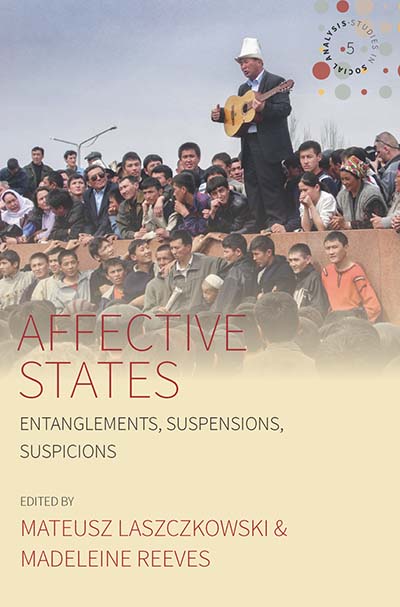
See Related
Anthropology JournalsEmail Newsletters
Sign up for our email newsletters to get customized updates on new Berghahn publications.
Breaking Boundaries
Varieties of Liminality
Edited by Agnes Horvath, Bjørn Thomassen, and Harald Wydra
264 pages, 7 illus., 1 table, bibliog., index
ISBN 978-1-78238-766-4 $135.00/£104.00 / Hb / Published (May 2015)
ISBN 978-1-78533-749-9 $29.95/£23.95 / Pb / Published (October 2017)
eISBN 978-1-83695-983-0 eBook
Reviews
“Breaking Boundaries is valuable for both its content and the expectation that the hegemonic conceptions of politics might be modified.” • Journal of the Royal Anthropological Institute
“The book [is] highly recommendable for its theoretical perspectives and for offering a rich dialogue between anthropology and other social sciences.” • Anthropology Notebooks
“In well integrated chapters, the [volume] proves the relevance of the concept across disciplines, particularly for the study of moments of instability and possibility, as well as for understanding the transformative potential of participation… In addition to helping one understand in-between experiences overall, [it] invites the reader to rethink the complicated relation between individual agency, social order and cultural transmission… a remarkable contribution to sociology, anthropology and critical theory.” • European Journal of Cultural and Political Sociology
“A topic with a very broad appeal, namely liminality, [is] treated here as an analytical concept. While liminality has been a widespread concept in anthropology and social theory for decades, largely owing to Victor Turner's seminal work, it has rarely been scrutinized properly, and this volume is to be welcomed. In some ways, this kind of book is long overdue.” • Thomas Hylland Eriksen, University of Oslo
“The book is a timely intervention which secures firmer grounding for liminality as one of the key concepts in social theory... Theoretically strong, and with an empirical range that takes in pre- and post-Revolutionary France, the frontier building of the American West, Egypt’s Tahrir Square, and the liminality of the postcommunist Eastern bloc, the book provides a valuable contribution to debates on liminality, transformation, and contingency in the social and political world.” • Les Roberts, University of Liverpool
Description
Liminality has the potential to be a leading paradigm for understanding transformation in a globalizing world. As a fundamental human experience, liminality transmits cultural practices, codes, rituals, and meanings in situations that fall between defined structures and have uncertain outcomes. Based on case studies of some of the most important crises in history, society, and politics, this volume explores the methodological range and applicability of the concept to a variety of concrete social and political problems.
Agnes Horvath is a co-founder and acting editor-in-chief of the peer-reviewed journal International Political Anthropology and is a visiting fellow in the Centre for the Study of the Moral Foundations of Economy & Society, University College Cork (Ireland). She is the author or co-author of eight books, including, most recently, Walling, Boundaries and Liminality: A political anthropology of transformations (co-edited with Marius Bentza, Routledge, 2018); Walking into the Void: A Historical, Sociological and Political Anthropology of Walking (co-edited with Arpad Szakolczai, Routledge, 2017), and Modernism and Charisma (Palgrave, 2013).
Bjørn Thomassen is Associate Professor in the Department of Society and Globalisation, Roskilde University, and is a founding editor of the journal International Political Anthropology. His recent publications include Liminality and the Modern: Living Through the In-Between (Ashgate 2014), and the edited collection Global Rome: Changing Faces of the Eternal City (Indiana University Press, 2014).
Harald Wydra is a Fellow of St Catharine’s College at the University of Cambridge, where he has taught politics since 2003, and is a co-founder and editor of the journal International Political Anthropology. His books include Communism and the Emergence of Democracy (Cambridge University Press, 2007), Democracy and Myth in Russia and Eastern Europe (co-edited with Alexander Wöll, Routledge, 2008), and Politics and the Sacred (Cambridge University Press, 2015).


